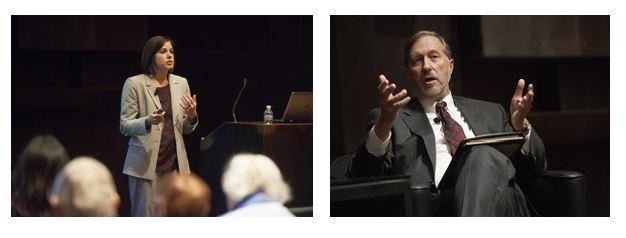
Thursday, December 4, 2014 - 12:30pm to 2:00pm
Johnson Great Room, McNamara Alumni Center
There is wide agreement that the medical malpractice system is dysfunctional, though political interest groups continue to clash about how to reform it. Even as battles over traditional reforms like damages caps persist, scholars and a handful of forward-thinking hospitals and liability insurers have moved forward with research and experimentation with innovative new approaches. This lecture will explore the case for a new direction in medical liability reform and highlight strategies that put patients first while enabling healthcare providers to avoid protracted, expensive legal battles. Approaches such as communication-and-resolution programs, judge-directed negotiation programs, and “safe harbors” for complying with practice guidelines, along-side stronger professional regulation of provider quality, can help shift the debate towards a new paradigm of accountability for safe care.
Dr. Mello teaches in the areas of public health law and public health ethics. She holds a J.D. from the Yale Law School, a Ph.D. in Health Policy and Administration from the University of North Carolina at Chapel Hill, an M.Phil. from Oxford University, where she was a Marshall Scholar, and a B.A. from Stanford University. In 2013, she was elected to the Institute of Medicine.
After Prof. Mello’s talk, commentator Prof. Jon Christianson, PhD, from the University of Minnesota’s School of Public Health, Division of Health Policy & Management, presented a short commentary. A moderated Q&A session followed.
Video is not available for this lecture.
Commentator:
Jon B. Christianson, PhD
University of Minnesota
School of Public Health
Division of Health Policy & Management
1.5 standard CLE credits are approved. Event ID: 197531. CME credits have been approved.
All participating faculty, course directors, and planning committee members are required to disclose to the program audience any financial relationships related to the subject matter of this program. Disclosure information is reviewed in advance in order to manage and resolve any possible conflicts of interest.
Support for the series comes from the law firm of Stinson Leonard Street and the Deinard family.
The Deinard Memorial Lecture on Law & Medicine is co-sponsored by the University of Minnesota's Joint Degree Program in Law, Science & Technology and the Center for Bioethics.

Michelle Mello, JD, PhD, is Professor of Law at Stanford Law School and Professor of Health Research and Policy at Stanford Medical School. She conducts empirical research into issues at the intersection of law, ethics, and health policy. She is the author of more than 130 articles and book chapters on the medical malpractice system, medical errors and patient safety, research ethics, the obesity epidemic, pharmaceuticals, clinical ethics, and other topics. Among other current projects, Dr. Mello is studying disclosure and compensation of medical injuries as the recipient of a Robert Wood Johnson Foundation (RWJF) Investigator Award in Health Policy Research.
From 2000 to 2014, Dr. Mello was a professor at the Harvard School of Public Health, where she directed the School’s Program in Law and Public Health. In 2013-14 she was a Lab Fellow at Harvard University’s Edmond J. Safra Center for Ethics. She currently serves as a Key Consultant to the National Program Office of the Robert Wood Johnson Foundation’s Public Health Law Research Program.
Dr. Mello teaches in the areas of public health law and public health ethics. She holds a J.D. from the Yale Law School, a Ph.D. in Health Policy and Administration from the University of North Carolina at Chapel Hill, an M.Phil. from Oxford University, where she was a Marshall Scholar, and a B.A. from Stanford University. In 2013, she was elected to the Institute of Medicine.
After Prof. Mello’s talk, commentator Prof. Jon Christianson, PhD, from the University of Minnesota’s School of Public Health, Division of Health Policy & Management, presented a short commentary. A moderated Q&A session followed.